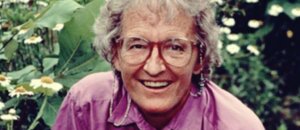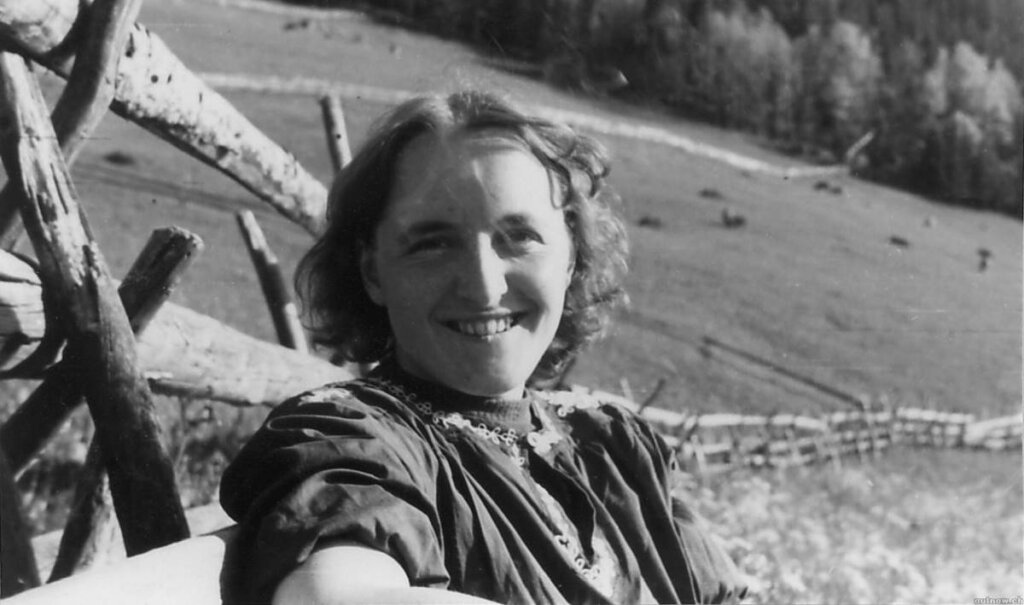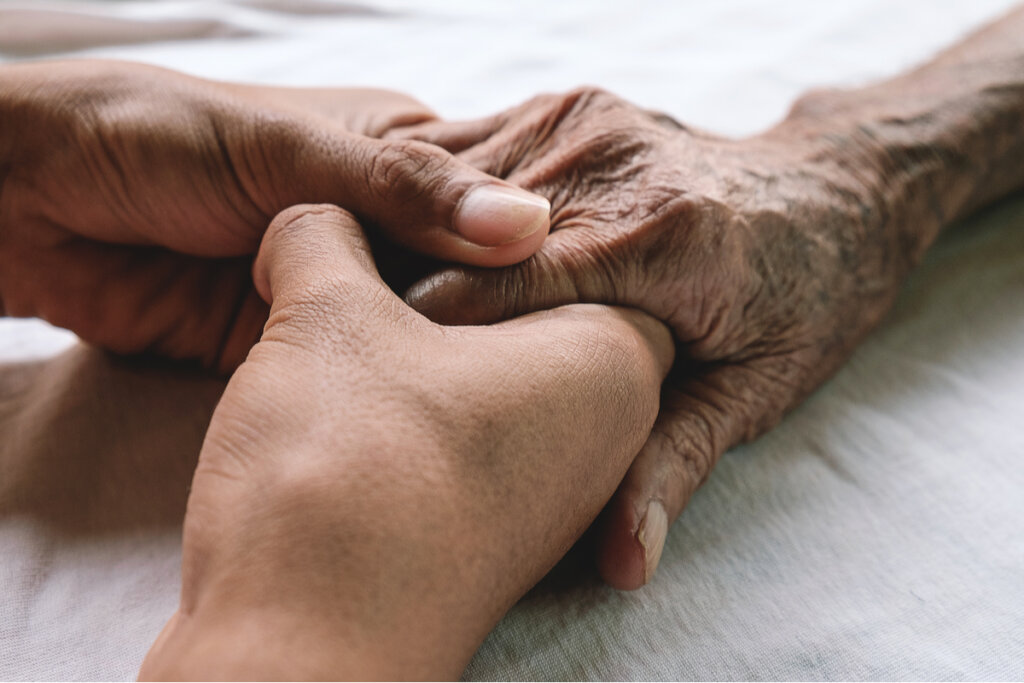Elisabeth Kübler-Ross: The Psychiatrist Who Taught Us About Death


Written and verified by the psychologist Valeria Sabater
Elisabeth Kübler-Ross changed the way the West viewed, treated, and understood death. She humanized it and introduced palliative care. She taught us how to deal with death with her famous theory on the phases of mourning and also reminded us that this ending isn’t so terrible for the one leaving. In fact, she set a trend and left us an indisputable legacy, one that’s still present today.
This psychiatrist of Swiss origin was awarded honorary degrees from 28 universities. In a documentary that showed a large part of her work, half the world was able to watch how Dr. Ross accompanied the dying and also children with terminal illnesses in their last moments. Her sensitivity was absolute and the way she gave relief, and even hope, to those who left and those who stayed made history.
She was nicknamed ‘the mother of death’ but, in reality, she was the ‘mother of life’. Because if there was one thing she taught us, it was to understand that human loss is part of our existence. The key is to enjoy every day to the fullest, learning to dignify those moments in which people embark on a journey to another plane. One that, according to the doctor herself, is full of love and light.
“The dying have always been teachers of great lessons, because when we are pushed towards the end of life is when we see it more clearly. By sharing with us their lessons, the dying teach us much about the immense value of life itself.”
-Elisabeth Kubler-Ross

Elisabeth Kübler-Ross: the woman who forged her own career
“You can be a secretary or a housekeeper, but you’ll never study medicine.” This is what Elisabeth Kübler-Ross’s father told her when she told him, at just eight years old, of her dream of becoming a doctor. She was born on July 8, 1926, in Zurich and was the smallest and most fragile of three triplets. However, that didn’t prevent her from deciding to leave home as soon as she turned 16. Her father’s resistance certainly wasn’t going to put up barriers to her desires and she undertook her own path alone.
She volunteered during World War II, helping in hospitals and caring for refugees. At the end of the war, she managed to get her medical degree from the University of Zurich and met an American doctor. She married him and they moved to the United States, where she specialized in psychiatry at the University of Colorado.
The need to give dignity to the dying
When Dr. Kübler-Ross arrived in the United States, she was shocked by the lack of psychological care for people with terminal illnesses, especially children. She was also aware of the carelessness and lack of sensitivity shown to the terminally ill and people who were, quite literally, on their deathbeds. Consequently, she tried to change it all and started what, in effect, was a necessary revolution.
She was a pioneer in establishing the modern foundations of palliative care. In her book, On Death and the Dying (1969), she exposed the Kübler-Ross model that would eventually be applied in multiple hospitals.
She also introduced a new course at the University of Chicago teaching the understanding of the dying process and the need to support terminally ill people. In those classes, sick people who had little time left to live came to give their testimony.
“Death is simply a shedding of the physical body like the butterfly shedding its cocoon. It is a transition to a higher state of consciousness where you contine to perceive, to understand, to laugh, and be able to grow.”
-Elisabeth Kübler-Ross-
The Kübler–Ross model
Commonly known as the five stages of grief, the Kübler-Ross model suggests a process by which people deal with loss in five phases. These are:
- Denial.
- Anger.
- Bargaining.
- Depression.
- Acceptance.
Kübler-Ross originally applied this model to people who were terminally ill, but later extended it to any experience of loss. Therefore, it represents the grieving process in the face of any significant event in life, such as the loss of a job, the death of a loved one, a divorce, drug addiction, a diagnosis of infertility, etc.
Kübler-Ross claimed that these stages don’t necessarily happen in the order presented above; nor that all of them are experienced by all people (although everyone undergoes at least two of them).
Most commonly, people go through several phases of the process in a ‘roller coaster’ effect, wavering between two or more, and repeating it one or more times before the end.
Whatever the case, ideally, the process shouldn’t be speeded up or prolonged. We must merely be aware that the stages will be overcome and that the final state of acceptance will arrive. Some will reach it faster than others as it’s an intensely personal process.
“As we experience loss we also experience those we love – and sometimes even strangers – caring for us in our times of need. Loss is a hole in our heart. But it is a hole that calls forth love and can hold love from others”.
-Elisabeth Kubler-Ross
Caring for families and mourning the loss
Elisabeth Kübler-Ross helped thousands of families. She did so by providing them with strategies to accompany the person on their deathbed with dignity and to subsequently manage their own loss once they died. Her classic model of grief made it easier for people to manage the emotions that arose in these experiences.
Her work and inspiration favored the creation of multiple foundations to promote dignified death. She even tried to create a hospice for children affected by AIDS, but since those were the first years of the epidemic, she was criticized and hindered in carrying it out. It was forever to be a thorn in her side.
Dr. Kübler-Ross wrote more than 20 books on death and traveled the world to teach her seminars on death, life, and transition. She invested the entire income she earned in organizing retreats to help people overcome their losses, and deal with their illnesses, fears, and anxieties regarding the end of life.

Kübler-Ross: death is like a new dawn, a transition to another stage
One of her most controversial books was, without a doubt, On Life After Death. In it, she suggested that death simply means passing to a new state of consciousness. It means transcending to a state full of love and indescribable well-being surrounded by light. From there, a journey of spiritual growth begins, according to Dr. Kübler-Ross.
This view was criticized by the scientific community. Indeed, while her models of palliative care and coping with loss and illness were well received and promoted, this aspect related to the more intimate and spiritual vision of what death was for her and it wasn’t well received.
Despite this, there are many people who continue to support her ideas and who feel comforted by harboring that vision. In fact, her reassuring and hopeful lessons about death and life remain extremely relevant today.
Elisabeth Kübler-Ross changed the way the West viewed, treated, and understood death. She humanized it and introduced palliative care. She taught us how to deal with death with her famous theory on the phases of mourning and also reminded us that this ending isn’t so terrible for the one leaving. In fact, she set a trend and left us an indisputable legacy, one that’s still present today.
This psychiatrist of Swiss origin was awarded honorary degrees from 28 universities. In a documentary that showed a large part of her work, half the world was able to watch how Dr. Ross accompanied the dying and also children with terminal illnesses in their last moments. Her sensitivity was absolute and the way she gave relief, and even hope, to those who left and those who stayed made history.
She was nicknamed ‘the mother of death’ but, in reality, she was the ‘mother of life’. Because if there was one thing she taught us, it was to understand that human loss is part of our existence. The key is to enjoy every day to the fullest, learning to dignify those moments in which people embark on a journey to another plane. One that, according to the doctor herself, is full of love and light.
“The dying have always been teachers of great lessons, because when we are pushed towards the end of life is when we see it more clearly. By sharing with us their lessons, the dying teach us much about the immense value of life itself.”
-Elisabeth Kubler-Ross

Elisabeth Kübler-Ross: the woman who forged her own career
“You can be a secretary or a housekeeper, but you’ll never study medicine.” This is what Elisabeth Kübler-Ross’s father told her when she told him, at just eight years old, of her dream of becoming a doctor. She was born on July 8, 1926, in Zurich and was the smallest and most fragile of three triplets. However, that didn’t prevent her from deciding to leave home as soon as she turned 16. Her father’s resistance certainly wasn’t going to put up barriers to her desires and she undertook her own path alone.
She volunteered during World War II, helping in hospitals and caring for refugees. At the end of the war, she managed to get her medical degree from the University of Zurich and met an American doctor. She married him and they moved to the United States, where she specialized in psychiatry at the University of Colorado.
The need to give dignity to the dying
When Dr. Kübler-Ross arrived in the United States, she was shocked by the lack of psychological care for people with terminal illnesses, especially children. She was also aware of the carelessness and lack of sensitivity shown to the terminally ill and people who were, quite literally, on their deathbeds. Consequently, she tried to change it all and started what, in effect, was a necessary revolution.
She was a pioneer in establishing the modern foundations of palliative care. In her book, On Death and the Dying (1969), she exposed the Kübler-Ross model that would eventually be applied in multiple hospitals.
She also introduced a new course at the University of Chicago teaching the understanding of the dying process and the need to support terminally ill people. In those classes, sick people who had little time left to live came to give their testimony.
“Death is simply a shedding of the physical body like the butterfly shedding its cocoon. It is a transition to a higher state of consciousness where you contine to perceive, to understand, to laugh, and be able to grow.”
-Elisabeth Kübler-Ross-
The Kübler–Ross model
Commonly known as the five stages of grief, the Kübler-Ross model suggests a process by which people deal with loss in five phases. These are:
- Denial.
- Anger.
- Bargaining.
- Depression.
- Acceptance.
Kübler-Ross originally applied this model to people who were terminally ill, but later extended it to any experience of loss. Therefore, it represents the grieving process in the face of any significant event in life, such as the loss of a job, the death of a loved one, a divorce, drug addiction, a diagnosis of infertility, etc.
Kübler-Ross claimed that these stages don’t necessarily happen in the order presented above; nor that all of them are experienced by all people (although everyone undergoes at least two of them).
Most commonly, people go through several phases of the process in a ‘roller coaster’ effect, wavering between two or more, and repeating it one or more times before the end.
Whatever the case, ideally, the process shouldn’t be speeded up or prolonged. We must merely be aware that the stages will be overcome and that the final state of acceptance will arrive. Some will reach it faster than others as it’s an intensely personal process.
“As we experience loss we also experience those we love – and sometimes even strangers – caring for us in our times of need. Loss is a hole in our heart. But it is a hole that calls forth love and can hold love from others”.
-Elisabeth Kubler-Ross
Caring for families and mourning the loss
Elisabeth Kübler-Ross helped thousands of families. She did so by providing them with strategies to accompany the person on their deathbed with dignity and to subsequently manage their own loss once they died. Her classic model of grief made it easier for people to manage the emotions that arose in these experiences.
Her work and inspiration favored the creation of multiple foundations to promote dignified death. She even tried to create a hospice for children affected by AIDS, but since those were the first years of the epidemic, she was criticized and hindered in carrying it out. It was forever to be a thorn in her side.
Dr. Kübler-Ross wrote more than 20 books on death and traveled the world to teach her seminars on death, life, and transition. She invested the entire income she earned in organizing retreats to help people overcome their losses, and deal with their illnesses, fears, and anxieties regarding the end of life.

Kübler-Ross: death is like a new dawn, a transition to another stage
One of her most controversial books was, without a doubt, On Life After Death. In it, she suggested that death simply means passing to a new state of consciousness. It means transcending to a state full of love and indescribable well-being surrounded by light. From there, a journey of spiritual growth begins, according to Dr. Kübler-Ross.
This view was criticized by the scientific community. Indeed, while her models of palliative care and coping with loss and illness were well received and promoted, this aspect related to the more intimate and spiritual vision of what death was for her and it wasn’t well received.
Despite this, there are many people who continue to support her ideas and who feel comforted by harboring that vision. In fact, her reassuring and hopeful lessons about death and life remain extremely relevant today.
All cited sources were thoroughly reviewed by our team to ensure their quality, reliability, currency, and validity. The bibliography of this article was considered reliable and of academic or scientific accuracy.
- Kübler-Ross, Elisabeth (2005) La muerte un amanecer. Luciérnaga
- Kübler-Ross, Elisabeth (2001) Sobre la muerte y los moribundos. Luciérnaga
- Kübler-Ross, Elisabeth (199) Sobre la muerte y el dolor. Luciérnaga
- Kübler-Ross, Elisabeth (2003) La rueda de la vida. Luciérnaga
This text is provided for informational purposes only and does not replace consultation with a professional. If in doubt, consult your specialist.







